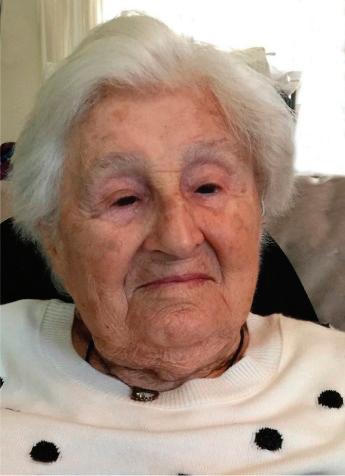
7 minute read
Koreva Vladlena
5.Meaning and Truths
What do you like to do in your spare time? What energizes
Advertisement
you?
“’Before COVID-19 I would go out with friends to a class every
Monday at WIZO. They had different speakers. We would have lunch afterwards. There were 12 to 18 girls in our group, all over 70.I was the oldest.”
What are the things in your life that you really value?
“My daughters, my grandchildren, and my great grandchildren.”
What have you learned about life that you can pass along to future
generations?
“Nothing good came out of the Holocaust, but I learned that you can survive.”
Life Lessons-2020
Name: Vladlena Koreva
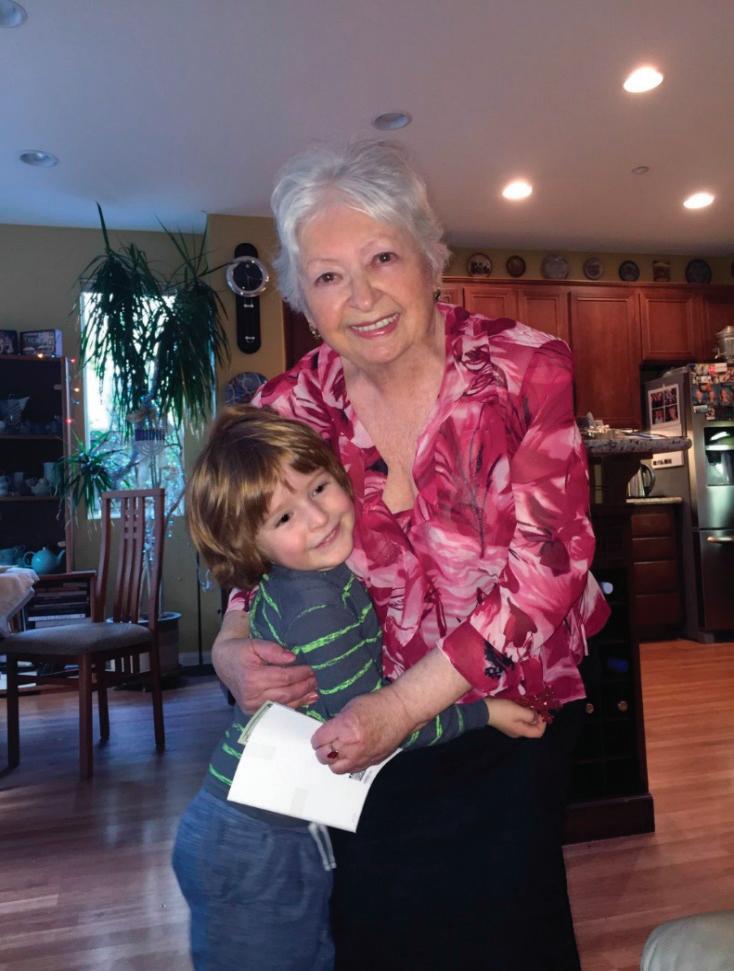
Vladlena and her great grandson
Vladlena Koreva, 87 years old
Short Biography:
“I was born in a shtetl in Ukraine called Bershed in 1933 and moved to Kiev soon after I was born. I was the only child and had a normal childhood. I took dance lessons and would take trips to Bershed to visit my grandparents and stay for the summer. I had lots of friends and we spoke Yiddish and it was very joyful. On June 22, 1941, life changed abruptly. The war started in Kiev, but we were visiting in Bershed and my father was fighting on the front. He died in the war. My mother and grandparents and I evacuated to Northern Caucasus and when the Nazis
approached, we evacuated to Turkmenia in Central Asia until 1945. After the war, we returned to Kiev. I then finished school and later was accepted to university to study linguistics. My uncle had to bribe them to take me because there was a Jewish quota. I was married in 1955 and had my daughter in 1957. I came to the U.S. in 1990 after my daughter came. I have one granddaughter and two great-grandsons.”
1.Looking at Myself
Please tell me about yourself when you were a child.
“I was very spoiled because I was the only child, my parents and grandparents paid a lot of attention to me. I was raised in a loving environment with lots of attention. I always thought life would be like this.”
Have you carried any lessons from the Holocaust with
you throughout life?

Vladlena in her 20s
“In concentration camps, people managed to keep hope and strength alive and managed to celebrate holidays such as Passover and Hanukkah and even had weddings during such horrific times. Hungry women even wrote and exchanged recipes in the evenings and in the middle of the night, created recipes on pieces of scrap paper. Throughout my life, I understood we Jews are strong, we help each other, lift each other up. We are talented, triumphant, and I have so much respect for our people. On September 29-30, 1941, the massacre in Babi Yar by the Nazis killed 34,000 Jews and 100,000 people in total. On this day in September, we used to come to this tragic place with friends to cry, to remember, to get together with other
Jewish mourners. Now there is a huge memorial in the park; the newest exposition offers high columns with holes, like traces of bullets. When people pass by, they see their own reflection in the polished columns.” What do you enjoy?
“I enjoy life. I value life even at 87 years old. I love America. I love every leaf on a tree. I enjoy the sun. I enjoy everything around me. I love to read and be on the
Internet.”
How do you like to spend your time?
“I enjoy learning new things. I like books and movies. I want to gain knowledge from what I read and hear. I love my daughter and granddaughter and great grandsons. I know how to occupy my time.”
What is something that your friends and family would say you are great at?
“I hope people would say that I’m honest and devoted in friendship. All of them appreciated our hospitality. My husband and I invited guests to our house very often, and I did my best to be a good and attentive hostess, listened to everyone and maintained interesting conversation. The relationship in my family was unbelievably close, truthful and open.”
2.Hope and Strength
What gave you hope until now?
“I try to remain positive and always set my mind up for positivity. I am an optimistic person and even today with little hope for the future, I try not to think about the negative. I must look at things in smaller increments of time.”
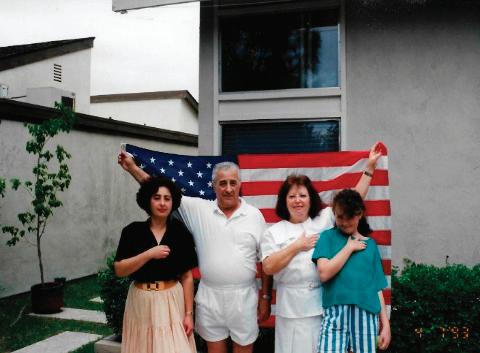
Vladlena with husband, daughter, granddaughter
What does a good day look like for you? What makes it a good day?
“A good day for me is when I go on my walks and I am pain free, especially nowadays. I need my walks to feel good. I take my headphones and listen to music. I prefer to end my day with a nice walk after I have done all my essential things.”
What helps you get through difficult times?
“Time helps me get through things. Memories help me get through things. The death of my husband was so hard on me, so I used my memories to remind me of the good times. Also, your body helps you get through pain. Of course, my family helps me through, too.”
What are you currently doing independently?
“On good days I am walking. I also watch a lot of movies. I choose what I like and navigate Netflix. I also use the Internet to watch films and lectures. I talk to relatives on Skype and try to cook and do everything on my own.”
Tell me something you are proud of.
“The most important thing was that we were able to come to this country when we did. And we were able to retain the same values we had before we got here. To treat other with kindness and sincerity.”
3.Challenges and Successes
What do you enjoy doing the most? “I love to write. I like to be around people with interesting views. We don’t have to agree, but we can engage in conversation.”
Discussion with friends in Kiev
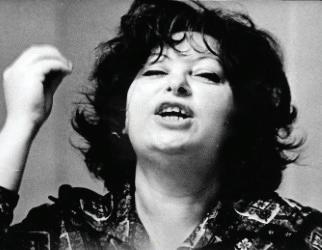
What have you learned so far that could be helpful moving forward? “We came to a new country so it could feel like home and we could feel certain it would be positive for future generations. That everyone could have happiness in their country and make a good life for themselves. Access to food, education, etc. This is what we believed America to be. But I realized reality is not always perfect. There are problems in this country too.”
What resources do you have around you to make this easier? “I have my family around me. They make things easier for me. I can speak my mind and I still have my family. We need leaders who can keep this country together.”
When did you achieve something you are proud of? “I am proud of my position here. I came to a foreign land with rules from the old land. It took me many years but then I figured out what this country is about. And I’m proud of what I’ve discovered and learned, and I’m not influenced by propaganda.”
Do you think the Holocaust prevented you from achieving anything in life or
held you back in any way?
“Everything that happened to me personally - lack of books, lack of education, etc. - happened because of the war. But with the help of those who believed in me, I stepped up and got educated and read and learned as much as I could even though I had obstacles as a Jew.”
4.Connections-
Friends, Family, and the World
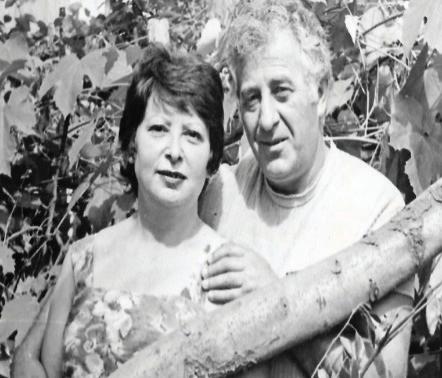
Vladlena with her husband in Kiev
What did you learn about your family when you
were young?
“My mother had two brothers. My uncles always included us, especially after the war because I lost my father. My uncles were like my friends; they had my back.”
Who are the special people on whom you can depend? “I have a variety of people I can depend on. My friends, my husband when he was alive, and of course my daughter today. But mainly I depend on myself from how I start my morning to what I read to what I get done.”
What role do you play in the lives of the people you care about? “My family comes to me for love but not for advice. I am older but do not interfere because my role is not the same as when I was young. I go to them for advice now.”
Who supports you in your day-to-day life? In what way? “My daughter calls me several times a day to check on me. JFS also provides me with support that I can depend on and it’s so touching, and I wish I could pay back. Also, my caregiver really helps me day to day.”
Did the Holocaust change your understanding of the world? Do you think you
understand the world better now? Or not as well?
“The Holocaust turned my world around and I can’t believe some people don’t believe it ever happened.”










